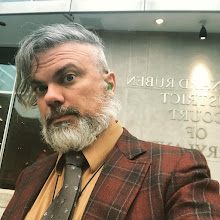In his last sermon before his death Father Alexander Schmemman made a very bold claim, ``Everyone capable of thanksgiving is capable of salvation and eternal joy.'' Bold as this claim may be soteriologically, it is far bolder as an insight into human nature. For we all, by virtue of being created in the image and likeness of God, are created with the capacity to be thankful. We all have the ability to receive the blessings we are given with gratitude, to look those who provide us with the things we want and need in the eye and be thankful. Sometimes we give voice to our thanks. Sometimes we do not. Either way, receiving what we have been given thankfully is something that happens in our hearts and souls, not in our words or deeds. When the words and deeds do come it is because of what first happens in our hearts. If they do not come, it doesn't necessarily mean that our hearts are hard. (Although, it may mean just that.) It may just mean that we are unable or unwilling to express the interior gratitude that we feel.
But one of the amazing things about the human condition is that we can change who we are. While we are all created in the image of God, we are also creatures with souls and bodies whose thoughts, words, and deeds affect who we are in our hearts. Our choices shape us no less certainly than the breath of God that first animated each of us in our mother's womb. When we center our minds on the virtues, our words are virtuous and predispose us to act virtuously. When we center our minds on vice, our words are harsh, spiteful, envious, lustful and predispose us to act shamefully in a manner unbecoming creatures who were created in the image of God.
Over time these choices that we make shape us and mold us for good or for ill. The third century Christian mystic Origen of Alexandria observed that ``The sun, by one and the same power of its heat, melts wax indeed, but dries up and hardens mud: not that its power operates one way upon mud, and in another way upon wax; but that the qualities of mud and wax are different, although according to nature they are one thing, both being from the earth.'' This wondrous capacity for choice can bake our hearts like hardened mud in the heat of the sun or soften our hearts like molten wax in those same rays of warmth. How we all choose to use our capacity as the children of God determines whether we have a heart of mud or a heart of wax. How we direct our thoughts, what words we say, what actions we take all shape us and determine just what our interior disposition is.
This interior disposition is entirely the difference between heaven and hell. For the rays of invisible light that are the energies of God are inescapable. God is present everywhere and in all things. God does not punish the sinful by hiding Himself nor reward the blessed by gracing them with His presence. Rather, as Doctor Alexander Kalomiros states in his essay River of Fire, the ``attitude of the logical creatures toward this unceasing grace and love is the difference between paradise and hell.'' For those creatures ``who love God are happy with Him, those who hate Him are extremely miserable by being obliged to live in His presence, and there is no place where one can escape the loving omnipresence of God.'' In this life in a world that has been corrupted by generations of bad choices, we can never perfectly experience the love of God. But we can taste it. We can catch glimpses of it here and there. To those who make their hearts into wax, this is joy. To those who make their hearts into mud, this is horror. Come judgment day, this foretaste will be amplified by the removal of all corruption. Doctor Kalimiros continues:
The Light of Truth, God's Energy, God's grace which will fall on men unhindered by corrupt conditions in the Day of Judgment, will be the same to all men. There will be no distinction whatever. All the difference lies in those who receive, not in Him Who gives. The sun shines on healthy and diseased eyes alike, without any distinction. Healthy eyes enjoy light and because of it see clearly the beauty which surrounds them. Diseased eyes feel pain, they hurt, suffer, and want to hide from this same light which brings such great happiness to those who have healthy eyes.So to repeat the words of Father Schmemman, ``Everyone capable of thanksgiving is capable of salvation and eternal joy.'' Being thankful tells us that our hearts are not completely hard. Being thankful tells us that we are still capable of receiving love. Allowing this inner gratitude to bubble up out of our hearts and into words and deeds shapes us into new creatures more likely to accept love from not only God but also from our brothers and sisters. Embracing this thankfulness is not only our very salvation but gives us a taste of heaven in this life. To be thankful is to become more fully the likeness of Deity itself, to be join into the ecstatic union with the Godhead in this life.

No comments:
Post a Comment